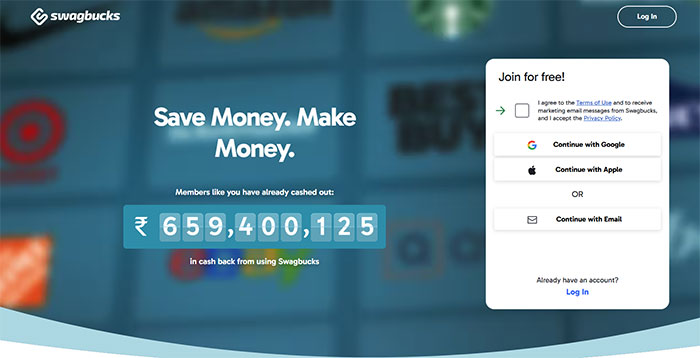Ryan was in his final year of college—a time when life feels full of possibilities, but also full of financial struggles. He was in his final year of the college. His parents sent him a modest monthly allowance, just enough to cover books, hostel rent, and basic meals at the mess. But Ryan wanted more. He wanted to travel on weekends with his friends, buy new sneakers, and sometimes just sit in a café sipping coffee without worrying about the bill.
Like many students, he had plenty of spare time between lectures and late-night study sessions. One evening, while scrolling through his phone, he typed into Google: “Ways On How to Make Money Online as a Student”
That search became the start of a long journey filled with disappointments, scams, and finally—success!
Ryan tried almost everything the internet threw at him.
- He signed up for an app that promised to pay him for watching ads and short videos. At first, the rewards trickled in—$0.23 here, $0.34 there—but within a week the payments stopped, and the app conveniently “crashed” every time he tried to redeem his balance.
- He attempted reselling phone accessories through an online marketplace, thinking it would be easy money. But the reality was different. The suppliers demanded bulk orders, shipping costs ate into his margin, and without initial capital, he couldn’t keep the business running.
- A friend lured him into cryptocurrency trading apps with stories of overnight profits. Ryan invested his tiny savings, but one bad decision wiped out his balance in a single afternoon. The experience left him shaken, and he promised himself never to gamble money he couldn’t afford to lose.
- Out of desperation, he even clicked on shady “data entry job” advertisements that guaranteed $250 a month. After hours of typing work, he discovered the site required him to pay a “processing fee” before withdrawing—another clear scam.
By the third month of trying, Ryan was completely frustrated. Every path he tried seemed to demand money upfront, advanced skills, or endless hours of work with no results. His confidence was dropping, and he started to believe making money online was just an illusion.
Just when he was about to give up, his roommate said casually over dinner: “Why don’t you try Online Surveys for Money? They’re simple. You just give your opinion and get paid. No investment required.”
Ryan was skeptical. “Who would pay for my opinion?” But after all his failures, he decided to give it one last shot.
On his very first evening of research, Ryan sat with his laptop, half-expecting to find another scam. But what he uncovered surprised him. He learned that global companies spend billions of dollars every year on market research—a massive industry quietly shaping the products and services people use every day. Big names like Coca-Cola, Nike, and Samsung didn’t just launch products blindly; they tested everything first, from the flavor of a new drink to the color of a phone model. And how did they gather this data? By asking people like Ryan.
Instead of knocking on doors or stopping strangers at malls like in the old days, these companies relied on online survey panels. These were websites that acted as a bridge—connecting businesses that needed opinions with ordinary people willing to share them.
At first, Ryan couldn’t believe it. “So, they’ll pay me just to tell them what I like?” he muttered to himself. But the more he read, the clearer it became: companies valued honest consumer opinions enough to pay for them, even if it was just a few dollars per survey.
The process looked almost too simple:
- Sign up on a survey website and create a free account.
- Fill out a detailed profile—age, gender, interests, habits, and lifestyle choices. (The more accurate, the better the survey matches.)
- Wait as the site matched him with surveys—anything from testing a new food flavor, to sharing thoughts on streaming apps, to giving feedback on online ads.
- Complete the surveys—some short and sweet at 5 minutes, others dragging for 30 minutes with dozens of questions.
- Earn rewards—points, PayPal cash, or sometimes even Amazon vouchers.
At first, Ryan hesitated. His very first survey asked him about breakfast cereals. It felt oddly silly to spend ten minutes describing how often he ate cornflakes or oats, but when he saw the small reward credited to his account instantly, he sat up straighter.
Then came the bigger twist. After completing five short surveys in a week, Ryan realized he had enough points to redeem $5 via PayPal. Nervously, he clicked “withdraw.” For two days, he kept checking his email, doubting it would ever arrive. Then—ping!—a PayPal notification lit up his phone. The money was real.
That tiny deposit might not have been much, but for Ryan, it was a turning point. He smiled to himself, thinking, “Finally—something that actually works.” It wasn’t just the money; it was the validation that his time online could have value. For the first time, after months of failed attempts, Ryan felt he had found a genuine way to earn without being tricked.
And with that, he decided to dive deeper into the world of online surveys—little knowing that along with opportunities, it would also bring new challenges, scams, and lessons about the digital money-making world.
The Pros of Online Surveys (Ryan’s Perspective)
After a few months of experimenting, Ryan began seeing the bright side of online surveys. One night, he sat with his diary and started listing the positives. Each point had a memory attached to it—moments that made him realize why he was still sticking with this side hustle.
1. Flexibility and Freedom
Ryan remembered one evening when his friends dragged him to the campus canteen. While waiting for their Maggi to arrive, he pulled out his phone and completed a 7-minute survey about new snack flavors. By the time his noodles were served, $0.57 was credited to his account. It felt surreal—earning money while hanging out with friends.
2. No Skills, No Investment
He often laughed thinking about how he had once signed up for a freelance coding job, only to stare blankly at the project description because he didn’t know a single programming language. Surveys, on the other hand, only asked him questions like: “Do you prefer cola or fruit juice?” or “How often do you order food online?” Simple, honest answers—no special skills required.
3. Instant Access
He remembered how frustrated he had been when a freelancing site kept his application “under review” for three weeks. In contrast, the first survey site he joined let him earn points within minutes of signing up. That instant gratification was addictive—it felt like the internet had finally opened its doors to him.
4. Small but Consistent Rewards
One Friday night, Ryan wanted to join his hostel mates for a movie, but he didn’t have enough cash. Quickly, he completed three surveys, converted his points into an Amazon voucher, and booked the ticket online. Sitting in the theater, popcorn in hand, he realized: surveys might not make him rich, but they were dependable when he needed quick money.
5. Safe and Reliable Payouts
The first time $6 hit his PayPal account, Ryan refreshed the screen three times to make sure it wasn’t a glitch. He even showed it to his roommate. Compared to shady ad-watching apps that never paid, this felt like magic. A small but reliable stream of money was finally flowing his way.
6. A Sense of Independence
The biggest win came when he bought his own train ticket for a weekend trip with friends. Usually, he would call his parents for such expenses, but this time he quietly used his survey earnings. As he boarded the train, ticket in hand, he felt proud—like he had taken his first step toward financial independence.
The Cons of Online Surveys (The Harsh Truth)
But life wasn’t all rosy. Along with these little victories came frustrations that tested his patience. Some days, Ryan wondered if the effort was even worth it.
1. Low Pay Compared to Time Spent
One afternoon, he spent nearly 20 minutes carefully answering questions about toothpaste brands—only to receive $0.30. He laughed bitterly, realizing he had just earned less than what a roadside tea vendor makes in the same time. It stung, but he shrugged and moved on.
2. Disqualification Frustrations
Perhaps the most annoying moments came when he was kicked out of surveys halfway through. Once, after answering ten questions about his diet, the screen flashed: “Sorry, you don’t qualify for this survey.” No reward, no explanation. Ryan wanted to throw his phone across the room, but instead he just grumbled and looked for the next one.
3. Time-Consuming for Small Gains
On another day, he decided to push himself—“Let’s see how much I can make in 4 hours straight.” At the end of that marathon session, his earnings were barely $3.45. It was money, yes, but his back ached, his eyes hurt, and he wondered if it was worth all that time.
4. Scams Lurking Everywhere
One flashy website promised $300 a month and asked for his debit card details to “activate premium surveys.” Ryan nearly entered the details, but a gut feeling stopped him. Later, when he googled reviews, he discovered dozens of people had been cheated by the same site. That close call taught him never to trust grand promises.
5. No Long-Term Growth
One evening, his senior collegues in the hostel were discussing internships and resume-building. Ryan sat quietly, realizing that unlike them, his surveys weren’t giving him experience he could add to his CV. They paid his bills, yes, but they weren’t building his future career. That thought lingered with him for days.
Despite these disappointments, Ryan couldn’t deny one thing: surveys were honest. They didn’t promise him millions, but they gave him enough for his coffee, his movie nights, and his small luxuries. Compared to the scams he had fallen into before, that honesty mattered more than anything.
The Scams Ryan Encountered
Ryan’s first month in the “survey world” wasn’t smooth sailing. In fact, it was like walking through a maze full of traps. He had just started feeling excited about making money online when the darker side of the internet revealed itself.
One night, while sipping chai in his hostel room, he found a shiny-looking website that boldly declared:
“Earn $80 a week from surveys—guaranteed! Limited offer, join today!”
For a college student whose monthly allowance barely touched $25, that number looked like gold. The site only asked for a one-time $50 “membership fee” to unlock “premium surveys.” Ryan reached for his debit card, his heart racing. But then something felt off. He scrolled down—no company address, no contact number, no refund policy. Just generic promises. That hesitation saved him from what could have been his first big mistake.
Another time, he downloaded an app that claimed: “Instant PayPal transfers after every survey.” Excited, he filled out four surveys in a row. Each one showed “$1.72 earned” on the screen, but when he tried to withdraw, it only displayed: “Processing… please wait.” Days turned into weeks. Nothing came. Later, he found dozens of angry reviews on Google Play—no one had ever been paid. That was his wake-up call.
But the scariest moment came when a slick-looking platform asked for his bank login credentials under the pretext of “verifying his account for payouts.” At first, he thought maybe it was a security check. Luckily, a quick search revealed that several students had lost money to the same trick. Ryan immediately exited and deleted the app.
Sadly, Ryan’s experiences weren’t unusual. According to a 2023 report by the Better Business Bureau, nearly 1 in 3 online survey offers floating around on social media or shady websites are scams. And students like Ryan, who are eager to earn quick money, often fall victim first.
How He Saved Himself from Scams
After these close calls, Ryan sat down one evening with his notebook and wrote a list of survival rules—his own “cheat sheet” to avoid ever getting tricked again. It became his personal code, and he followed it strictly:
Never pay to join a survey site. If a site asks for “activation fees,” it’s almost always a scam. Legit survey platforms are free to use.
Always check reviews first. Ryan made it a habit to search sites on Reddit threads like r/BeermoneyIndia and review sites like Trustpilot. If he saw too many red flags, he skipped it.
Look for real payment proof. He often checked YouTube videos where people recorded live withdrawals. If nobody could show proof, he didn’t bother.
Beware of unrealistic promises. “Earn $500 to $750 a month from surveys” sounded good, but Ryan learned it was nonsense. Realistic earnings were around $25 – $50 a month if he was consistent.
Protect personal data. He shared only non-sensitive details like age, gender, and general interests. He never shared banking passwords, Aadhaar numbers, or card details.
These rules became his armor. Soon, Ryan was confidently navigating the online survey jungle, only sticking to trusted, established platforms. And with every safe payout he received, his trust in the process grew stronger.
How Ryan Found Legitimate Survey Sites
After escaping a few close calls with scams, Ryan realized that finding the right survey sites was like hunting for diamonds in a coal mine. He couldn’t afford to waste any more evenings filling out fake forms. So, one night in the hostel library, armed with his laptop, coffee, and determination, he decided to dig deeper. He spent hours scrolling through Reddit threads, Quora answers, and Trustpilot reviews, noting down the names that came up again and again. Slowly, a pattern emerged—there were a handful of platforms that everyone seemed to trust.
Ryan’s notebook filled up with a short list of “genuine sites that actually pay.” And this time, he cross-verified each one before signing up. He also watched this important video that shared top sites that pay good money for online surveys –
1. Swagbucks

One of the most popular sites worldwide, with over 60 million members. It wasn’t just about surveys; he could earn points for watching videos, searching the web, or even shopping online. Ryan loved that flexibility. In his first month, he made around $20 just by mixing surveys with casual video-watching during study breaks.
2. Survey Junkie
A clean, no-nonsense platform. Unlike others that tried to lure people with gimmicks, this one focused purely on surveys. It had over 11 million users and claimed to send $40 million in payouts annually. For Ryan, it became a go-to for quick, easy surveys when he had 10–15 minutes to spare.
3. InboxDollars
This one felt fun. Instead of only surveys, Ryan could get paid for small tasks like reading emails or downloading trial apps. It had already paid over $80 million to members since its launch, and while most tasks paid cents, they added up quickly. Ryan used it like pocket change money.
4. Toluna Influencers
This site stood out for its interactive polls and community vibe. It had partnerships with brands like Amazon and Coca-Cola. Ryan found himself doing quirky polls like “Which emoji do you use the most?” and still earning rewards for them.
5. Pinecone Research
The holy grail of survey sites. It was hard to get accepted, but once inside, the surveys paid $3–$5 each—much higher than average. For Ryan, landing a Pinecone invite felt like unlocking a secret level in a video game.
He signed up for all of them. The logic was simple: one site might not give him surveys every day, but with five running at once, his chances doubled or even tripled. By spreading out his efforts, Ryan noticed his survey income climbing steadily from just a few hundred dollars to over $40 a month—enough to cover his hostel internet bill and weekend travel plans.
For the first time, he felt in control. The scams were behind him, and the legitimate opportunities ahead finally made his dream of earning online a reality.
How Ryan Maximized His Earnings?
In the beginning, Ryan’s survey journey felt like finding loose change under the sofa cushions. A few dollars here, a small voucher there—nice, but nowhere close to what he really needed. His first week brought him barely $5, which, while better than nothing, wasn’t enough to cover even his monthly phone bill. But Ryan wasn’t the kind of person to give up easily. He decided that if surveys could work for others, he just needed to be smarter about how he approached them.
So, he treated it like a mini side business and began experimenting. Slowly, he cracked the code.
Here’s how Ryan turned his trickle of earnings into a steady stream of $90–$120 a month – enough to cover his hostel rent, books, and even a few weekend trips with friends:
1. Completed His Profile 100%
Ryan realized that survey sites used his profile to decide whether to match him with a project. Research showed that users with complete profiles received up to 40% more survey invitations. By honestly detailing his habits (like being a Netflix-watcher and a regular tea drinker), he started landing surveys that paid $1–$3 each instead of just the $0.8 ones.
2. Checked at Peak Hours
Most surveys had limited slots and filled up quickly. Ryan noticed that new surveys often dropped early morning (around 7–9 AM) and late at night (10–11 PM). By logging in during these windows, he claimed high-paying ones before others could. On busy days, this trick alone added an extra $12 a week to his wallet.
3. Joined Multiple Platforms
Sticking to one site was like fishing in a small pond. So Ryan expanded to five platforms—Swagbucks, Survey Junkie, Toluna, InboxDollars, and Pinecone Research. Statistics showed that active users on multiple sites earned 2–3x more than single-site users. When one site was slow, another always had fresh work.
4. Cashed Out Quickly
Ryan learned from online forums that about 1 in 10 small survey sites shut down unexpectedly every year. To avoid losing points, he cashed out as soon as he reached the minimum threshold—often $5–$12. It kept his earnings safe and gave him a little thrill every time money hit his PayPal.
5. Referral Programs = Bonus Goldmine
When Ryan discovered referral programs, things took off. Sites like Swagbucks offered 10% lifetime earnings from referrals. He invited classmates, hostel mates, and even his younger cousins. Within two months, his referrals alone contributed around $20 a month—passive income from other people’s clicks.
6. Focused on High-Paying Surveys
Early on, Ryan wasted time on surveys paying $0.057 or $0.11. But soon, he got strategic. He filtered out low-paying ones and went after product tests and brand research that paid $2.5–$5 each. Some even sent him free product samples (snacks, shampoo bottles, and once a gaming headset!) in exchange for reviews.
7. Turned Downtime into “Survey Time”
Ryan stopped scrolling Instagram endlessly during bus rides or chai breaks. Instead, he pulled up his survey apps. A study by Statista showed that the average Indian spends 4.9 hours daily on their phone—Ryan decided at least 30 minutes of his screen time would earn money, not just likes.
Within three months, Ryan had a system. His PayPal balance began growing steadily, and every cash-out gave him a sense of victory. From $6 a week, he scaled to nearly $25 – $30 a week, consistently hitting $90 to $120 monthly.
For a college student who once struggled with pocket money, this was nothing short of a breakthrough. He wasn’t just surviving anymore—he was funding his hostel rent, saving for a solo trip to Manali, and even surprising his parents with small gifts.
Conclusion – A Small Start, a Big Change
Ryan’s story is not extraordinary—it could be any student’s story. Online surveys didn’t make him a millionaire, but they gave him independence, confidence, and the first taste of earning through the internet.
For students, homemakers, or anyone with spare time, surveys are a simple way to earn extra money. They’re not a career, but they’re a step in the right direction.
As Ryan often tells his juniors:
“Don’t expect millions, but if you want extra coffee money, a weekend trip, or just the joy of paying your own bills—online surveys might just surprise you.”





